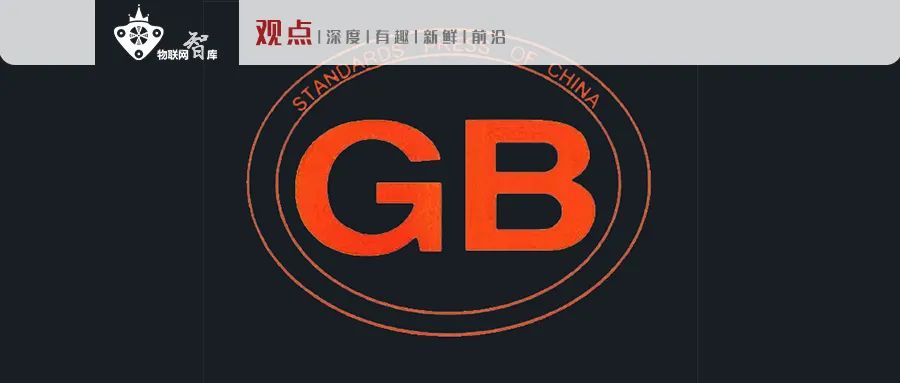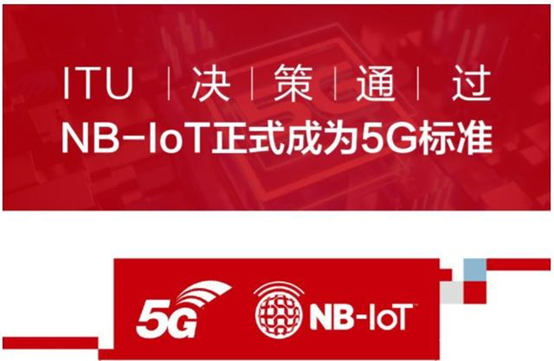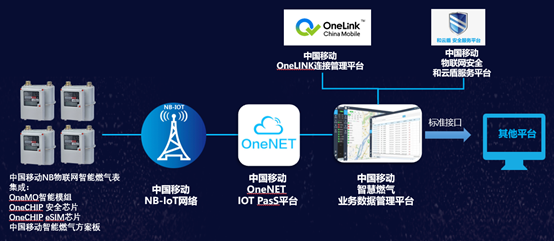

The first national standard for smart gas meters has been set, and NB-IoT is officially included in 5G. Is the spring of the industry coming?

In 2014, the world's leading operator Vodafone teamed up with Huawei to carry out technological innovation and launched Cellular IoT (C-IoT) communication technology - the predecessor of NB-IoT technology. The goal is to achieve "customer wireless meter reading without maintenance for 10 years" "To meet the needs of water customers for low-power wireless meter reading.
After that, NB-IoT did indeed become a global IoT standard as expected at the time, and brought strong industrial influence. Not only water meters, but also the smart meter industry including electricity meters and gas meters has ushered in rapid development.
From the perspective of the product itself, the biggest difference between the NB IoT gas meter and the traditional gas meter is that it is no longer just a gas volume monitoring device, but with the realization of remote control, price adjustment and other functions, the whole data is generated from In the process of transmission and precipitation analysis, it has evolved into an overall end-to-end solution, and the integrated gas meter reading solution composed of "cloud, pipe and end" provides a unified solution.
However,As the functions of smart gas meters are gradually improved, the initially designed IoT meter standards have many shortcomings. Therefore, the launch of new end-to-end solutions for the Internet of Things and industry standards is imminent.
Standards have been set, and smart gas meters have entered a comprehensive development stage

In my country, the earliest smart gas meters can probably be traced back to IC card gas meters. Diaphragm gas meters using IC cards as media and equipped with electronic controllers are the mainstream, mainly realizing prepayment and gas consumption control functions. On the user side, one household, one table and one card are implemented.
However, card-type gas meters generally have shortcomings such as poor anti-interference ability, short-lasting power supply, easy valve failure, and easy damage to the card holder, making it impossible to realize real-time data transmission. With the rapid development and iteration of communication technology, Far EasTone gas meters combined with communication technology have rapidly become popular, especially smart meters combined with NB-IoT technology.
Although Far EasTone gas meters represented by NB-IoT meters have technically implemented more and more functions,For a long time, the country has not established a unified standard system for the smart gas meter industry, which brings a lot of inconvenience and impact to product design, manufacturing, experimentation, acceptance, management, etc. Therefore, at present, my country's gas meter market is still occupied by most mid- to low-end ordinary membrane meters and IC card meters.
In October 2019, the National Standards Committee officially issued the "Overall Requirements for Internet of Things Systems for Smart Gas Meter Applications" (Plan Number: 20193197-T-469) national standard formulation and revision plan. In December of the same year, a national standards launch meeting was held.This is the first national standard for the application of Internet of Things technology in the field of smart gas meters..
At the same time, the ITU-R WP5D meeting held by the International Telecommunication Union (ITU) concluded successfully on July 9, 2020. Among them, an important highlight is that NB-IoT and NR have officially become 5G standards, which reflects that NB-IoT has been widely recognized as a 5G technology.
In addition, with the inclination of policies such as 5G and new infrastructure, as well as the maturity of various technologies and products related to "cloud-pipe-device" integrated solutions, standards that are truly beneficial to the industry and valuable to industry operators are about to emerge. After the IoT of gas meters has gone through the early trial stage, it is finally about to usher in the stage of standardization and comprehensive development.
Judging from the accumulated experience of the overall Internet of Things industry, for actual vertical fields, the two key dimensions of "security" and "scale operation" have become constraints on whether the industrial Internet of Things can develop stably in the long term. The smart gas meter industry Future development may not be an exception. Specifically:
- Data security is like the public security system in a carbon-based society and is a necessary factor for the stability of this society. The IoT ecosystem without security support is destined to be water without a source and a tree without roots. When it develops to a certain stage, it will either be directly replaced by an ecosystem with security capabilities, or it will go through a painful iterative process of overthrowing it from the bottom up. Therefore, in the early stages of industry development, the importance of safety cannot be ignored.
- In the era of massively connected Internet of Things, it is likely that products and services will be “cheap and good” under the influence of scale effects, and ultimately the winner will take all. Therefore, in the Internet of Things era, enterprises with the ability to specify standards and rapidly scale up will be the biggest leaders and beneficiaries in the process of Internet of Things in vertical fields.
Based on these considerations, China Mobile Internet of Things Company has developed a complete set of NB gas integrated end-to-end solutions from a macro perspective, focusing on two major points and centrally solving some of the pain points of gas Party A.

Four major issues, China Mobile Internet of Things Company Bingfeng's direction
China Mobile IoT's self-developed NB gas integrated end-to-end solution is based on China Mobile IoT's self-developed core capabilities, including China Mobile communication module (OneMO), China Mobile national security chip (SE- SIM) + security platform (Heyundun), China Mobile Internet of Things Company IoT cloud platform (OneNET), China Mobile IoT connection management platform (OneLink), etc., and are equipped with exclusive applications based on the gas industry, with hundreds of millions of Class-level connection scale and extensive implementation experience can effectively ensure the stability, versatility and openness of the entire system.
In one sentence, the NB IoT meter end-to-end solution provided by China Mobile IoT mainly highlights the advantages of "integrated" services and can effectively solve the four major problems in the development process of smart gas meters.
First, there is the issue of cost.

For traditional NB IoT tables, the inflated price needs to be mainly reflected in the following three dimensions: high passed-on procurement costs, high shared after-sales costs, and high follow-up operation and risk costs.
First of all, the traditional model often involves many procurement integrators, including module manufacturers, chip manufacturers, various component manufacturers, platform providers, network operators, etc., which will cause layer upon layer price increases and pass-on procurement cost issues. In this regard, China Mobile Internet of Things Company has given full play to the advantages of centralized procurement and self-research. That is, the core hardware and platform adopt self-developed products, which can significantly reduce the sales price without the need for external procurement while ensuring quality. At the same time, for a small number of modules that need to be purchased outsourced, China Mobile Internet of Things can also take advantage of centralized procurement and purchase them at a lower cost price.
Secondly, for after-sales cost sharing, China Mobile Internet of Things adopts the "diagnosis first, payment later" model, which can optimize the after-sales plan and cost according to Party A's needs. In response to the different needs of gas Party A, China Mobile Internet of Things can provide after-sales maintenance ranging from 1 to N years and charge different prices to reasonably reduce the procurement cost of gas companies.
Finally, in the face of operational sharing and risk costs, China Mobile Internet of Things' core capabilities are geared toward the entire IoT industry. Its R&D, testing, after-sales and other costs can be shared across all areas such as platforms, modules, and chips, making the entire set of The solution has a unique scale advantage and can effectively reduce the purchase price.
Second, network and after-sales issues.

In the traditional model, communication services are often integrated as an additional service for the IoT meter, which is integrated by the solution provider and sold together with the IoT meter in a package to the gas company. However, the network problem is not a simple issue that can only consider the cost. As the "road" of the information highway, whether the network is smooth, secure, and "connected in all directions" has become the basic condition for whether a gas company can invest in strategic layout of the Internet of Things.
On the one hand, the original integrators or equipment manufacturers have uneven understanding of network technical issues and the relevant policies of operators' internal network assurance. At the same time, their coordination capabilities and efficiency in network construction are relatively low. On the other hand, equipment manufacturers and gas companies may not always reach an agreement due to interests or other considerations.
In the era of the Internet of People, communication networks are more generally close to standardized services. With the advent of the 5G and Internet of Things era, networks will increasingly provide differentiated services based on the specific needs of industries and even customers, that is, "on-demand network construction and specialized services." This change will also bring about a huge transformation of business models. For gas companies, direct connection with operators and unified network cooperation may be a better choice.
As a wholly-owned subsidiary of China Mobile, China Mobile Internet of Things Company is one of the leading units in the construction of the Internet of Things of China Mobile Group. Relying on the "5G Big Connection" strategy of China Mobile Group and under the national strategic instructions of the Ministry of Industry and Information Technology, namely the "Notice of the General Office of the Ministry of Industry and Information Technology on Further Promoting the Comprehensive Development of the Mobile Internet of Things", China Mobile Group's latest network construction policy has been fully implemented .
On the one hand, as an internal company of China Mobile, in the process of cooperation with Provincial Mobile, China Mobile IoT Company can carry out more comprehensive network coordination work with relatively high efficiency, and can promote relevant policies from the top based on the actual usage needs of customers. implementation and implementation. On the other hand, the upgrade from traditional gas meters to NB IoT gas meters is not only a change in the terminal, but also requires strong cooperation from network, platform, data, security and other aspects to provide customers with end-to-end guarantee services. Under the original model, multi-party integrated solutions often made it difficult to define problems, and it was easy for all parties to pass the buck in the process of solving the problem, resulting in the gas company's problems not being solved in a timely and effective manner.
In order to solve after-sales problems, China Mobile Internet of Things Company provides a complete "cloud, pipe and terminal" integrated fully self-developed end-to-end solution, and through the cooperation agreement reached between China Mobile Group and China Mobile's provincial companies, it ensures It integrates the signing party of the gas company contract, the equipment developer, and the service commitment party. Any network, hardware and platform problems that arise will be analyzed and solved by the mobile group internally, which can provide a one-stop "one-stop" solution for the gas company. "Turnkey" service greatly reduces the difficulty of construction and management of gas companies and greatly protects the interests of gas companies.
Third, safety issues.

If network security is not protected, even personal terminals such as mobile phones or computers may cause huge losses. For IoT meter reading systems with heavier investment, more equipment, greater value, and heavier responsibilities, the risks and losses that may be caused by malicious network attacks are even greater.
However, security itself does not create new value, which also leads to many customers tending to ignore the construction and investment in security. In this case, once a "black swan" event occurs, major problems may occur in systems that usually operate normally.
At the same time, a networked meter reading system generally undertakes multiple functions such as data collection, remote billing, over-the-air recharge, and remote price adjustment. As the scale of the overall construction continues to expand, the motivation of hackers to commit cyber crimes is also increasing, and the damage caused will also be greater. It can be said that security issues are cancer cells hidden in the system, waiting for opportunities to "make trouble."
Faced with such severe security issues, China Mobile Internet of Things launched an end-to-end security solution for the gas industry. The solution consists of SE-SIM security chip and Cloud Shield - a security encryption service platform. It has been used in China Mobile's self-developed NB gas meter solution board has been used on a large scale and verified by the market. As a hardware carrier for the root of trust and a supporting security encryption service platform, SE-SIM supports a variety of international/domestic encryption algorithms and can provide the highest level of security.
Fourth, data compatibility issues.

Under the traditional business model, since different equipment manufacturers produce products with different standards, it is easy for data standards and communication protocols to be incompatible with each other. In order to ensure the unity of the platform, when a gas company reaches a cooperation with an equipment manufacturer, it is often not easy to replace it. If the equipment is replaced, it means that a system needs to be updated from the meter to the platform. This generally brings great consequences to operations and management. The high costs have even forced gas companies to bite the bullet and use their original suppliers.
At the same time, because the gas company itself cannot control the data and systems, it also poses many hidden dangers to future operations. If a gas company operates multiple systems, it will cause data inconsistency, making big data analysis, artificial intelligence, and data asset management impossible to talk about.
Faced with this industry situation, China Mobile Internet of Things, in collaboration with CCSA and other industry standard-setting organizations, actively promotes the formulation of industry standards, promotes the most comprehensive and beneficial data format for the business, and prevents Party A from being tied to a single manufacturer. At the same time, under the strict requirements of the state-owned enterprise background, the data output from the operator platform is directly transmitted to the gas company, and the data ownership often belongs to the gas company. With strong policy support, gas companies can actually enjoy the large-scale dividends and value brought by big data in the process of the Internet of Things in the industry.
write at the end
In the gas industry, with the formal entry of operators and the gradual formulation of industry standards, the development path of the industry has been basically clear. From a strategic perspective, it is an inevitable trend for gas companies to promote overall reform and achieve industrial upgrading and optimization. Under the background of 5G big connection, the gas industry will also become a benchmark industry for the in-depth transformation of the Internet of Things and terminal intelligence. Both enterprises and end users will fully enjoy the value and convenience brought by industry informatization and intelligence.
Compiled and released by the Internet of Things Think Tank
Smart City Network (www.scitycase.com) - continues to pay attention to the development of smart cities.
